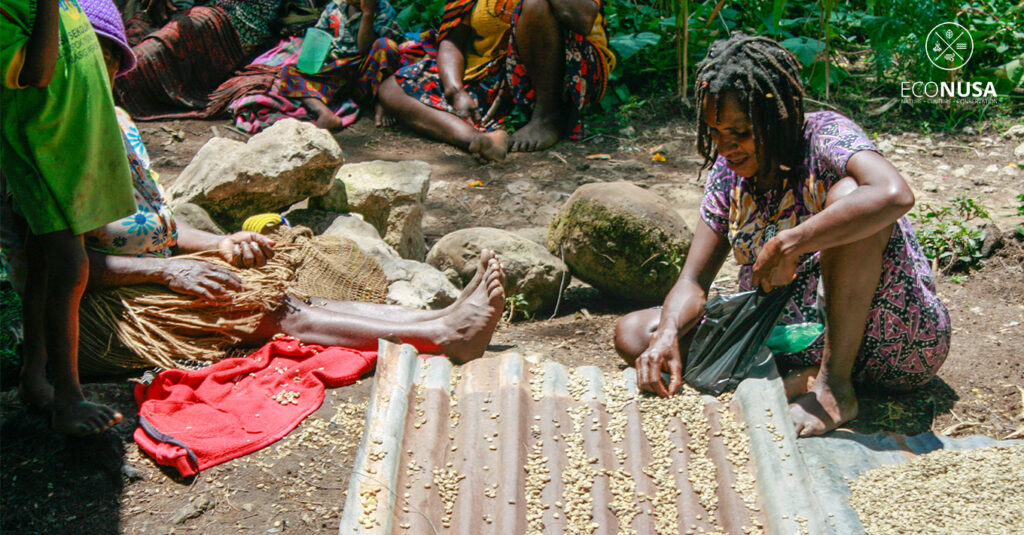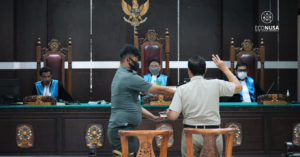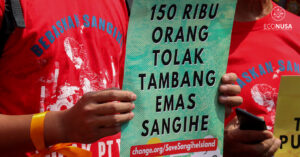
Kris Kadepa’s Arabica coffee from Agadide District in Paniai Regency, Central Papua Province, was among the 20 nominees of Arabica and Robusta coffee in the Jakarta Coffee Week (Jacoweek) 2022 held on 11-13 November 2022 at Pondok Indah, Jakarta.
Coffee from Paniai was in competition against other coffee from some Provinces such as Aceh, West Java, Jambi, Central Sulawesi, South Sulawesi, Central Java, East Nusa Tenggara, and Lampung. The winner of Cup of the Year 2022 from Arabica category was Elmiadi, a farmer from Kayuaor, Kerinci Regency in Jambi Province with anaerob natural process. In Robusta category, the winner was Lorens, a farmer from Rahong Utara, Manggarai Regency in East Nusa Tenggara Province with wine robusta process.
Jacoweek Cup of the Year is the competition of coffee flavor specialized for farmers that got assistance, roaster, and cupper. The event entitled “Brewing for Sustainable Future” tried to facilitate coffee lover in Indonesia while crafting a sustainable coffee industry.
Read also: Paniai Coffee, Red Gold for Livelihood
Nationwide farmers prepared their best selection of green bean for curation and serving. All visitors of Jacoweek could give their assessment from cup test. This is, as to the organizer, the effective way to identify coffee based on market preference.
Coffee Planting Movement
Regarding the existing local potential, the government of Paniai Regency proclaimed Coffee Planting Movement in 2021. EcoNusa through Yapkema has been providing assistance for coffee farmers for two years. Both institutions gave positive welcome to the initiative. The local government’s initiative here could lure many more new coffee farmers.
Hanok Herison Pigai, Yakema Director, said that the development of coffee in Paniai has run very well. “Arabica coffee development in Pania is deemed the community’s anticipation for deforestation threat and effort to craft economical value commodities for the sovereignty and welfare of indigenous people in Paniai,” said Hanok.
Read also: Paniai Coffee at a Glance
Derek Kadepa, the Secretary of Fajar Timur District, said that many local peoples have so far had coffee grounds as their parents’ legacies, but not well cultivated yet. “I appreciate the current activity now. Let alone, it creates and uses local caders to succeed the coffee development program here,” Derek said.
He hoped that the community could learn how to nurture coffee properly with appropriate post-harvest process, and how to create and put organic fertilizer for coffee plants, and so on.
In response, Oktopianus Yogi, the Head of Aradide District, also emphasized that planting coffee is part of glorifying and defending the land as the legacy of their former generations. “Hence, people or outside company could hardly grab the existing land,” said Oktopianus.
Read also: Coffee Farming Safeguards Yourself in the Middle of a Pandemic
According to Oktopianus, even without support from the local government or foundation, the community should have planted coffee. “It will be the community who will get the yield. Let alone, with the program like this, the community should indeed take part in it. This is an opportunity,” he emphasized.
Paniai coffee and ecological benefit
Furthermore, Hanok explained that coffee cultivation gives both economic and ecological benefits. First, by planting coffee, the community could get economic benefit to suffice their sustenance so as to create economic independence. Second, coffee and tree planting would produce oxygen that could absorb carbon emission which causes global warming.
Without realizing it, by planting coffee the locals could prevent erosion. It implies that the community has participated in conservation of Paniai Lake in Central Papua which is located at 2,000 meters above sea level. “Besides, by planting coffee, the community defend their customary land,” Hanok added.
Read also: Robusta Coffee in Ambaidiru Village
Most of Mee tribal community as the predominant tribe in Paniai relies on their lives surrounding Paniai Lake. “Paniai Lake has long become the center of civilization of Mee people living who has now been under threat,” said Hanok.
According to Hanok, plastic has polluted more upstream spots in several rivers. Water hyacinth and weeds in some spots on the lake sides have narrowed down the lake surface. The poor awareness of local community on environment, the absence of appropriate anticipative, serious, and long-termed measures from the local government have worsened the issue including the sedimentation.
Based on the Indonesian Institute of Sciences (LIPI) released few years ago unveiled that Paniai Lake has been shallowing due to sand, soil, plastic waste, mud, and dry wood. They flowed to the lake through seven major rivers, namely Aga, Eka, Weya, Koto, Muye, Waneuwo, and Kowabeu Rivers.
Read also: Ambaidiru Coffee Plot as Buffer Zone for Yapen Nature Preserve
The sedimentation happened to the bed of Paniai Lake has become serious issue. As a result, the lake water capacity has been declining and every so often overflowing. The condition puts the surrounding residence, farming land, road, and some public facilities such as school and market at high risk of sinking.
Hanok believed that with coffee cultivation, the farmers and communities of Paniai have conserved Paniai Lake because the coffee and vegetations have prevented the areas from erosion and flooding.




